2, Pharmacodynamics
2.1 Definitions and certain Properties of Ligands on Opioid
Receptors
Opiates have long been known as natural substances which are found
in the juice of the poppy seeds, Papaver somniferous. The dried juice is known as Opium
and contains a mixture of opiate-alkaloids. In 1806 , the German chemist, Sertürner
Morphine, managed to isolate the main constituent from Opium, in it‘s pure form.
Through a few chemical changes, semi -synthetic opiates could be derived. Since 50 years,
one has been able to produce fully-synthetic substances, chemically unrelated but with the
same effect as morphine. Hughes described, in 1975, peptides from the human body which had
similar effects to morphine.
|
Tab.1: Opiates: are the approximately 20 natural
substances from the opium-juice of poppy seed capsule
|
|
Phenanthrenes: are opium alkaloids that have an
effect analogue to that of morphine. They are opioid effective opiates.
|
Benzylisochinoline: are opium alkaloids which have
no effect analogue to that of morphine.
|
| Morphine (Morphium): raw
opium contains 10-17% morphine Codeine: is used mainly as an antitussivum. Raw
opium contains 1-4% codeine. Thebaine: starting substance for synthesis of naloxon,
naltrexon and buprenorphine; has only a very slight effect on it’s own. |
Papaverine:
Phosphodiesterase inhibitor: works mainly spasmolytic. Noscapine: antitussivum
without addiction potential. Raw opium contains 2-9% noscapine. |
Often the use of the terms opiate is used instead of the term opioid.
In this manual these terms are used in a very precise manner:
- The term Opiate relates to the origin of a substance from opium, that is gained
out of the latex of the capsule of the opium plant, Papaver somniferous.
- Opioid is the term used for substances with an analogue effect to morphine. Opioids
are ligands on opioid-receptors and they possess an intrinsic activity.
Not all opiates bond to opioid-receptors: not all opiates are opioids.
Examples of such opiates are Papverin and Thebain, which do not bond to the
opioid-receptors and are not ligands on the receptors. Not all opioids are opiates and
belong to the same substance class as the opiates: Methadone is a synthetic opioid and
Beta-endorphin is a peptide-opioid substance found in the body.
Opioids, substances with effects similar to morphine:
- Natural opioids, opioid opiates
- Semi -synthetic opioids
- Synthetic opioids
- Active metabolic products from Heroin and Morphine
- Endogenic, opioid peptides
Tab.2:
Opiates |
Morphine
Morphium |
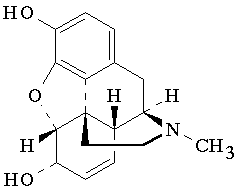
|
Analgesic, natural opioid
Duration of effect: 4-5 hours; in retard form 6-12 hours
Elimination half-life: 3 hours (also in retard form)
Minimal deadly dose: 25 mg i.v.
Minimal deadly dose: 50 mg p.o.
|
Codeine
3-ortho-methyl-morphine |

|
Antitussivum, (analgesic), natural opioid
Duration of effect: 4-6 hours
Elimination half-life: 3-4 hours
|
Thebaine |
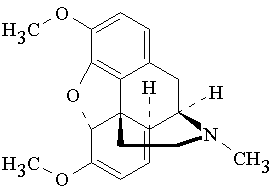
|
Starting substance for synthesis of naloxon,
naltrexon and buprenorphine
In itself has a very slight opioid effect |
Papaverine |
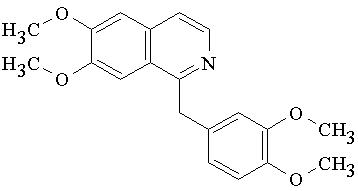
|
Spasmolytic, in itself no opioid effect
Phosphodiesterase inhibitor
|
Noscapine |
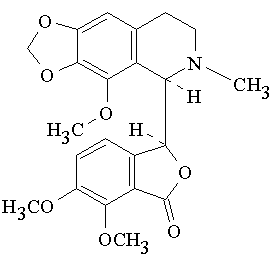
|
Antitussivum without addiction potential
In itself no opioid effect
|
The values given for half-life, length of effect and dosage should be
observed with care. There can be a large inter-individual variance and a large variance
depending on application. The length of effect in relation to analgesics can vary largely
to the length of abstinence preventing effect.
Tab.3:
Semi-Synthetic Opioids |
Heroin
Diamorphine DAM
3,6-O-Diacetylmorphine |
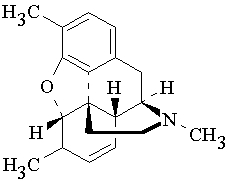
|
Analgesic
Duration of effect: 4-5 hours
Elimination half-life: 0.5 hours
Minimal deadly dose: 25 mg i.v.
from morphine through acetylation by acetic acid anhydride
|
Hydromorphone |
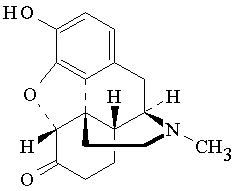
|
Analgesic
Duration of effect: 4-5 hours
Elimination half-life: 2.5 hours
|
Nicomorphine |
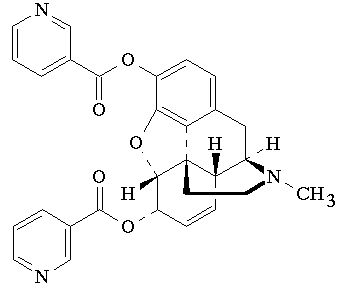
|
Analgesic
Duration of effect: 4-5 hours
Elimination half-life: 2-3 hours
|
Dihydrocodeine |
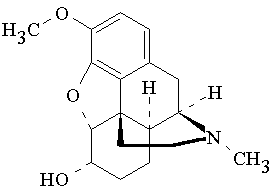
|
Antitussivum, (Analgesic)
Duration of effect: 4-5 hours
Elimination half-life: 4 hours
|
Hydrocodone
Dihydrocodeinone |
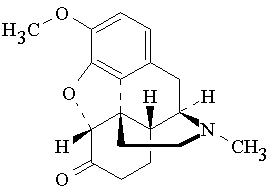
|
Antitussivum
Duration of effect: 8-10 hours
Elimination half-life: 4 hours
|
Buprenorphine |
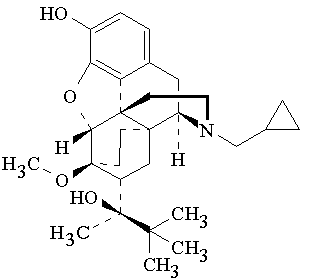
|
Analgesic
Duration of analgetic effect: 6-8 hours
Duration of withdrawal prevention effect in high doses up to 48 hours
Elimination half-life: 5 hours
Agonist/Antagonist; synthetised out of Thebain
|
Tab.4:
Synthetic Opioids |
Methadone |
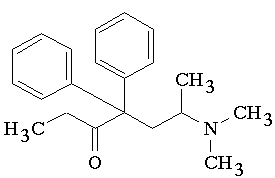
|
Analgesic
Duration of analgetic effect: 8-48 hours
Duration of withdrawal prevention effect in high doses: rarely less than 24 hours
Elimination half-life: 15-22 hours
Minimal deadly dose : 25 mg i.v.; 50 mg p.o.; 25 mg L-Methadone p.o
|
Dextromoramide |
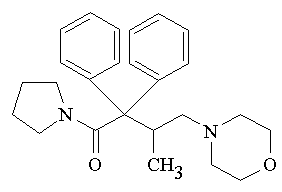
|
Analgesic
|
Tilidine |
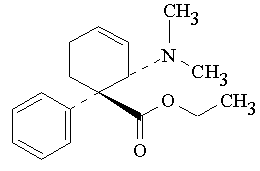
|
Analgesic
Duration of effect: 4-6 hours
Elimination half-life: 3-5 hours
|
Pethidine |
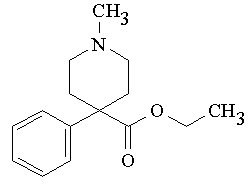
|
Analgesic
Duration of effect: 2-4 hours
Elimination half-life: 2.5-3 hours
|
Pentazocine |
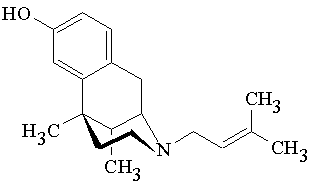
|
Analgesic
Duration of effect: 3 hours
Elimination half-life: 2-3 hours
Takes effect on k -Receptoren
agonistically and on the m
-Receptoren antagonistially
|
Back to Index of Part I















